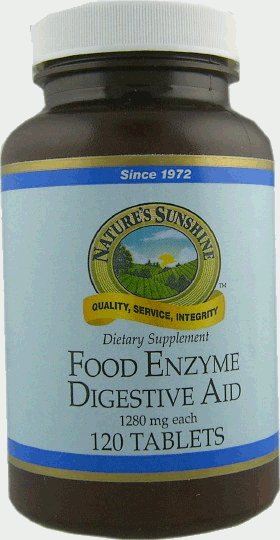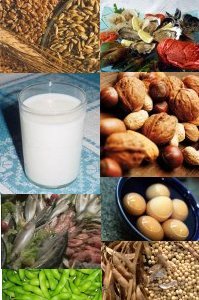| Share |  |
 | |||
The Key to Good Digestion
How well people digest their food determines in many ways the level of health they enjoy. Nutrients from even the best of foods cannot be utilized to build healthy cells and fuel the processes of the body if they are not sufficiently broken down into their smallest components. Many health issues people commonly suffer from relate to nutritional deficiencies caused by poor absorption and assimilation of foods or other sources of nutrients.
It is estimated that more than half of the population suffers with some type of digestive disorder. Over-the-counter antacids and drug remedies for digestive complaints are a multi-billion dollar business in the United States. Heartburn, gas, bloating, and stomach discomfort are looked upon as normal occurrences that just happen from time to time when a person eats. The truth is that these symptoms should never be experienced if foods are properly broken down and fully digested.
The Essential Role of Enzymes
 Although good digestion involves a number of factors, much of it is dependent upon the work of enzymes. An adequate supply of enzymes is vitally important for supporting a healthy body.
Although good digestion involves a number of factors, much of it is dependent upon the work of enzymes. An adequate supply of enzymes is vitally important for supporting a healthy body.
Enzymes are energized protein-based molecules that function as catalysts to activate or speed up numerous bodily functions. Not only do these “sparks” of life impact every biochemical reaction in the body but they also conduct a host of metabolic processes ranging from the production of hormones and neurotransmitters to detoxification of chemicals and other toxins in the liver.
Among the most important of the different types of enzymes produced by the body are digestive enzymes that work to transform food molecules into the essential compounds needed for health.
The body contains stores of digestive enzymes, which are secreted by the pancreas and other digestive organs for use in different stages of the digestive process.
The first stage of digestion occurs in the upper part of the stomach 30-45 minutes after the food is consumed. During this i nitial predigestive phase, digestion only occurs if active enzymes are present within the food. As much as one third of the digestive process is able to take place through the action of these naturally occurring food enzymes in the pre-digestive stage of digestion. The body produces digestive and metabolic enzymes, but food enzymes must be consumed through foods or supplements.
nitial predigestive phase, digestion only occurs if active enzymes are present within the food. As much as one third of the digestive process is able to take place through the action of these naturally occurring food enzymes in the pre-digestive stage of digestion. The body produces digestive and metabolic enzymes, but food enzymes must be consumed through foods or supplements.
Causes of Enzyme Deficiency
The problem that significantly interferes with effective digestion is that the enzymes contained within foods in their natural state are often destroyed or denatured when the food is heated above 118°. Microwaving and other commonly used cooking methods easily generate this amount of heat. Enzymes are further destroyed by the high heat used in pasteurization, milling,  canning, refining of oils, and other procedures involved in food processing. Even frozen vegetables are blanched before freezing, which involves heat that is high enough to destroy naturally occurring enzymes within the produce.
canning, refining of oils, and other procedures involved in food processing. Even frozen vegetables are blanched before freezing, which involves heat that is high enough to destroy naturally occurring enzymes within the produce.
The diets of the majority of people are enzyme-deficient since they consist primarily of cooked or processed foods with comparatively little raw fruits and vegetables. Even the enzymes in many fresh produce items are destroyed from the effects of irradiation that is increasingly used today. Long-term storage of produce also affects the potency of enzymes since they begin to diminish as soon as 24 hours after crops are picked (rarely will you find any food in a grocery store that still retains its original enzyme content). Pesticides, preservatives and other chemicals used in food production lessen the presence of live enzymes as well. Enzyme inhibitors added to certain types of processed foods to prevent spoilage and increase shelf-life further immobilize the work of enzymes, preventing a normal breakdown of those foods within our system.
Eating cooked, irradiated, processed or otherwise enzyme-deficient foods eliminates the opportunity for foods to break down in the pre-digestive stage of digestion. This hinders the effectiveness of the overall digestive process since no other enzymes or digestive secretions are available in that early stage of digestion to act on the food.
A number of other factors either decrease the amount of enzymes available for proper digestion or reduce the ability of existing ones to function. When foods are not chewed sufficiently, enzymes produced in the salivary glands to aid in the digestion of carbohydrates cannot work effectively. Moreover, drinking too much liquid with or right after meals dilutes needed digestive enzymes and secretions. Eating when stressed inhibits the secretion of enzymes as well as hydrochloric acid production needed for digestion. Lastly, the ability of the body to produce enzymes diminishes with age, which means that the older a person is, the fewer enzymes remain available in his or her body. All of these factors place an additional burden on digestive organs and reduce the activity of metabolic enzymes elsewhere in the body.
Problems Created from Lack of Enzymes
 When not enough food enzymes are present in the upper stomach during the pre-digestive phase of the digestive process, food sits undigested until it makes its way to the lower portion of the stomach where it is partially broken down by the action of hydrochloric acid and other gastric secretions. Pancreatic enzymes are later secreted in the small intestine to finish off the digestion of food particles prior to absorption.
When not enough food enzymes are present in the upper stomach during the pre-digestive phase of the digestive process, food sits undigested until it makes its way to the lower portion of the stomach where it is partially broken down by the action of hydrochloric acid and other gastric secretions. Pancreatic enzymes are later secreted in the small intestine to finish off the digestion of food particles prior to absorption.
Ideally, digestion reduces particles of food to their smallest components - proteins into amino acids, carbohydrates into simple sugars and fats into essential fatty acids - before being absorbed through the walls of the small intestine into the bloodstream to nourish the body. Since enzymes naturally exist in foods, it was never intended for the body to produce all of the enzymes necessary to completely digest our entire food intake.
Therefore, when enzyme-deficient foods are consumed, little (if any) pre-digestion takes place in the first phase of digestion. This means the body must draw from its limited stores of digestive enzymes and work harder in an effort to prepare food for absorption and assimilation. The pancreas, the primary enzyme-producing organ, must neglect its dual function of insulin production in order to meet the body’s need for extra enzymes. Over a period of years, it begins to wear out and cannot adequately keep up with either of its functions. Not only may blood sugar issues result from its inability to produce sufficient insulin, but the health of the body also may suffer from the effects of undigested food molecules that either remain in the small intestine or escape into the blood stream.
Undigested food particles in the intestines can give rise to intestinal toxicity, unfavorable bacterial growth, yeast overgrowth and impaired intestinal permeability, otherwise known as “leaky gut syndrome” (for further understanding of “leaky gut syndrome, I would refer you to my article “Food Allergies – Could They Be Your Problem? – Part 3”). These conditions compromise the integrity of the intestinal wall and allow larger molecules of undigested food to escape into the blood stream, resulting in further health challenges.
The immune system perceives these undigested food molecules (typically proteins since they are the most difficult to break down) as foreign invaders. It then mounts a defense by mobilizing white blood cells and creating antibodies, as it would do if it were dealing with an allergen, bacteria, cancer cell, or toxin. The constant excess production of white blood cells and antibodies overworks and eventually weakens the immune system. This makes a person far more susceptible to recurrent bacterial, viral and fungal infections. In addition, these microorganisms feed on the undigested protein and release toxic by-products that further compromise health.
Undigested food molecules in the blood also set up conditions that play an integral role in the development of food allergies and autoimmune diseases. The combination of undigested protein with fermented bacteria in the lower intestine is a precursor to the occurrence of more serious diseases such as colon cancer. Enzyme deficiency is also considered a contributing factor in the accumulation of cholesterol deposits along the inside of arterial walls that leads to heart disease.
In addition to the health problems cited above, poor digestion may result in fatigue, malnourishment and general weakness due to the fact that cells are not receiving adequate amounts of the vitamins, minerals, essential fatty acids, amino acids, and other nutrients needed to build healthy tissues. More obvious consequences of poor digestion are gastrointestinal problems such as heartburn, indigestion, bloating, gas, constipation, diarrhea and intestinal pain.
Making Up the Enzyme Deficit
 Eating a diet mostly comprised of raw foods is one way to make sure enough enzymes are available to begin the process of breaking food down in the first stages of digestion. Since that is not a realistic option for most people (we like our cooked foods!), the best way to support and enhance the digestive process is to take supplemental enzymes to replace those missing from food. Supplying the body with extra enzymes keeps it from being depleted and provides numerous advantages to health.
Eating a diet mostly comprised of raw foods is one way to make sure enough enzymes are available to begin the process of breaking food down in the first stages of digestion. Since that is not a realistic option for most people (we like our cooked foods!), the best way to support and enhance the digestive process is to take supplemental enzymes to replace those missing from food. Supplying the body with extra enzymes keeps it from being depleted and provides numerous advantages to health.
The main advantage of enzyme supplements is that they lessen the work of the digestive system and facilitate a more complete breakdown of food earlier in the digestive process. This helps to make nutrients more bioavailable to the body and aids the absorption and assimilation process as well.
Further, the more predigestive work done in the stomach, the more reduced the work load is for the pancreas and other organs involved in the digestive process. Taking supplemental digestive enzymes conserves the body’s enzyme supply by preventing the use of valuable metabolic enzymes since the presence of digested food in the stomach signals the body to produce fewer enzymes for the digestive process. The immune system is strengthened and helped as well since it no longer needs to constantly be on the offensive and can reserve it “forces” to fight true “foreign invaders.”
Improving digestion by regularly taking enzyme supplements prevents many of the symptoms of poor digestion. People who take them typically experience less of a full feeling after meals, decreased gas, bloating, indigestion, and other gastrointestinal symptoms rooted in improper digestion.
What Type of Enzymes Should Be Taken?
There are two basic types of enzyme supplements; those derived from plants and those derived from animals. Plant-based enzymes are generally more potent and stable in addition to being the safest for long-term use. They work in a broader pH range (from 2-11), which means they can handle the environments of the acidic stomach in addition to the alkaline small intestine. Animal-based enzymes, however, work only in a narrow range of pH (above 7.5) and can be easily destroyed by acidic gastric juices before they reach the alkaline environment of the small intestine if they do not possess a special coating to protect them.
Plant-based enzymes are typically extracted from the aspergillus fungus that is grown in a laboratory on different plants. Enzymes from animal sources, such as pancreatin, trypsin, and chymotrypsin are primarily derived from the pancreas and small intestine of pigs and cows, and are used more to supplement the types of enzymes produced by the human pancreas where proteins, carbohydrates and fats are further digested in the alkaline environment of the small intestine.
Eating meals comprised of many different types of food components requires a good multiple enzyme formula since each type of food ingested requires a different enzyme to break it down. The main types of enzymes found in a full-spectrum plant-based enzyme supplement are:
- Protease – responsible for the digestion of proteins into single amino acids
- Amylase – works to digest carbohydrates, starches and sugars and converts them into simple sugars used for energy in the body
- Lipase - breaks down fats found in most dairy products, nuts, oils, and meat and splits them into fatty acids and glycerol enables absorption of fat-soluble nutrients
- Lactase – breaks down the milk sugar lactose into glucose and galactose, which is especially important since over one third of the US population has a lactose deficiency
- Cellulase – is an enzyme mixture that breaks down cellulose, an indigestible fiber found in fruits and vegetables, into glucose
- Invertase – converts sucrose in carbohydrates into glucose and fructose some other types of naturally occurring enzymes used in digestive supplements are:
Bromelain – is an enzyme found in raw pineapple that aids in the breakdown of protein to form peptides and amino acids. Bromelain aids digestion by enhancing the effects of trypsin and pepsin.
Papain – is a protein-digesting enzyme derived from unripe papaya and papaya leaves that is used to break down animal proteins.
Pepsin - is an enzyme that digests proteins in the acidic environment of the stomach and is the principle component of gastric juice. Supplemental pepsin is usually prepared from the stomach of pigs and is only activated at a temperature higher than normal body temperature.
Pancreatin – is derived from bovine pancreatic enzymes to supplement the three enzymes (amylase, lipase and protease) produced by the pancreas to digest proteins, carbohydrates and fats in the alkaline environment of the small intestine.
Most everyone can benefit from a broad-spectrum plant-based enzyme formula that aids in the digestion of protein, fats and carbohydrates even if they experience no particular digestive issues. Some people may need additional help from other types of enzymes and digestive aids with digesting certain types of food. For instance, those with lactose intolerance would be wise to take an enzyme formula containing lactase whenever they consume dairy products. People with compromised liver or gallbladder function (or those whose gallbladders have been removed) may need extra amounts of lipase to emulsify and absorb fats in their diet. Formulas that contain herbs known to stimulate the digestive process in addition to the enzymes are even more beneficial. In order to give you a better idea of what types of enzyme formulas are available, I have included a brief descriptions of few different ones that I would recommend after the conclusion of this article.
Concluding Thoughts
Regularly taking supplemental enzymes, especially when eating cooked meals involving several different types of foods, is one of the best ways to support good digestion. By replacing enzymes missing from your food with high-quality supplemental enzymes, you not only ease the burden on your digestive organs but you also make an investment in your well-being that will reap many dividends in health down the road.
Next Month’s Focus:
Enzymes are not the only digestive aid sometimes necessary to ensure optimal digestion. In next month’s article, I will address the topic of stomach acid and how essential sufficient hydrochloric acid is to adequately break down the proteins we consume. Though many consider stomach acid a problem when it comes to digestion, you will learn the truth of its importance and the serious long-range consequences to health that result from either neutralizing it or inhibiting its production.
Recommended Enzyme Formulas
Proactazyme Plus – a general purpose plant-based enzyme containing amylase, glucoamylase, lipase, cellulase, hemicellulase, invertase, malt diastase, alpha galactosidase, peptidase and protease. These enzymes are in a digestion-enhancing herbal base of caraway, dandelion, fennel, gentian and ginger.
Food Enzymes – a special blend of enzymes that includes bromelain, lipase, amylase, pancreatin, papain and pepsin in addition to a small amount of betaine hydrochloride and bile salt to further assist protein and fat digestion.
Lastase Plus – contains lactase, protease and lipase, the enzymes used to break down sugar, protein and fat found in milk and other dairy products.
Hi-Lipase – contains plant-sourced lipase in an herbal base of caraway, dandelion, fennel, gentian and ginger for those with high-fat diets or problems digesting fats.
Protease Plus – a formula containing 60,000 HUT protease in a base of beet root fiber and full-spectrum, plant-sourced trace mineral concentrate to aid protein digestion in a pH range of 3.0-6.0. Also benefits joint and immune health by breaking down undigested proteins in the blood when taken between meals
Copyright © 2008-2015 Lucinda Bedogne, CNHP, CNC
Reader Comments...
| 2011-04-26 16:21:13 "I always enjoy reading Lucinda's articles! Very interesting and useful. Great job again Lucinda! love nanc" - Nancy |
Post Your Comment...
|
|
||||||||||||



